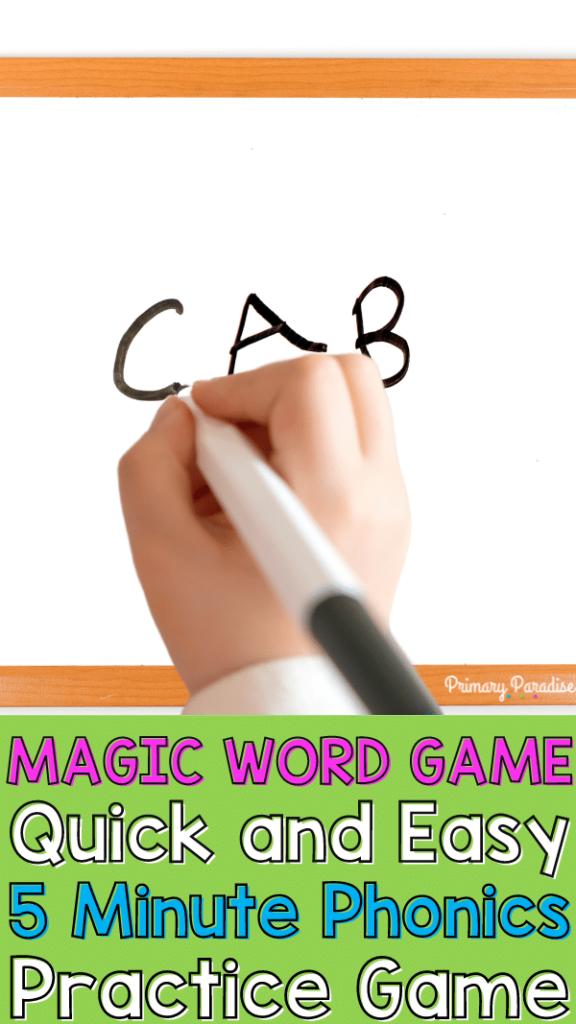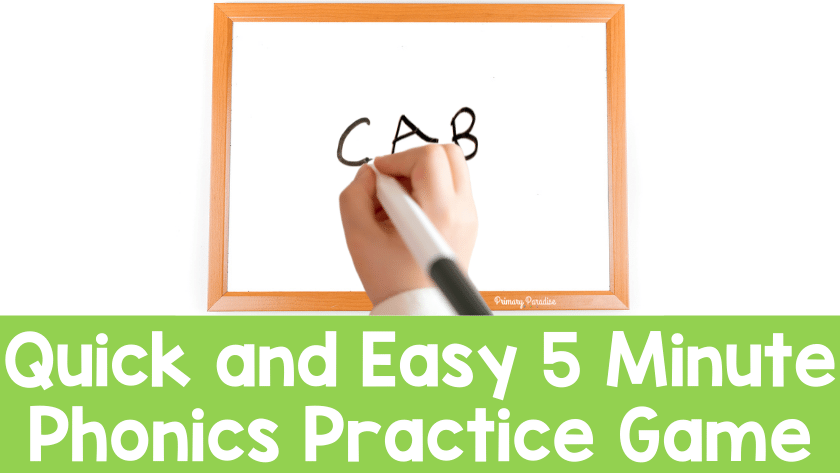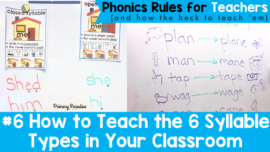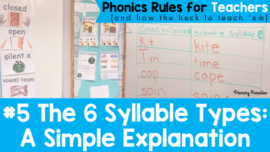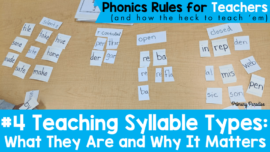When you have an extra five minutes before lunch or the end of the day, what do you do? This is a great time to get in some quick and easy word and phonics practice. Here is one of my favorite, simple games to sneak in some extra phonics practice: the magic word game!
What is the Magic Word Game?
When I was student teaching, my cooperating teacher used to play this game with our students as a quick phonics activity. It was such a great game because you can play with any words or sounds, you can play for as short or as long as you want, and the supplies needed are minimal.
Supplies needed for this Phonics Practice Game
To play this game, each student needs a small white board, a marker, and an eraser. (I like to use old baby socks as erasers.) If you don’t have white boards, you can play on paper with a pencil. However, it’s much easier to play on white boards.
How Do You Play the Magic Word Phonics Game?
The game is very simple, and can be adapted for your students. Give your students a letter or a sound to start with- example- cat. Everyone writes the word on their board. In the beginning, I like to either write the word on the big white board, or type it on the screen using a projector. Then, you ask your students to add, remove, or swap letters to create new words. It’s that simple!
Why do I call it the magic word game? Well, there are two reasons. First, we learn that we can magically change words into new words with one simple change at a time. And second, in my class, we always end up back at the first word.
How can you change up the word?

There are a variety of ways to change the word, and this is where knowing your class comes in handy. Here are the ones I use most when we’re playing this phonics practice game.
Add/take away the letter that says… The first option is to ask students to add or take away a letter/letters based on the sound. Instead of identifying a letter by the name, they have to know the sound. I particularly like to use this one for vowel sounds since students often have a hard time distinguishing between them. Example: start with cat. Take away the letter that makes the /c/ sound. What word do you have now? at.
Add/take away the letter… The second option is to ask them to add or remember a letter by name. I don’t use this as often since I would much prefer my students to focus on the letter sounds. Example: Okay, you have at now. Add the letter m to the beginning of the word. What word do you have now? mat.
Swap the letter that says… for the letter/s that say… The next option is a swap. This is a bit more complicated, so I don’t use this until my students are very confident with the other options. Example: Great! We have mat. Now, swap the letter that says /m/ with the TWO letters that say /th/. What do we have now? that.
Swap letter… for letter… This is the same as above, except you say the letter name instead of the letter sound. Example: We have that. Now, swap the first t for a c. What do we have now? chat.
Make… into… The last option is to have students figure out what to add and where. This one can be a bit tricky, so again, I don’t use this one right away. However, it’s really great practice and helps me see who needs to work on what phonics skills. Example: We have chat. Can you turn chat into chart? Who can tell me how we spelled chart? c-h-a-r-t.
How Do you Decide What Words to Use?
Although we often play this phonics word game on the fly, if I know we will be playing the magic word game to practice our phonics skills, I like to write down a list of words. This guarantees I can practice a variety of sounds and skills. And, since my kiddos love when we end on the same word again, I can plan it out. Here’s an example of how I plan out my words.
Example: play -lay- ray-tray-trap-tap-tip-dip-din-dine-fine-fin-pin-pan-plan-play
What If I Can’t Think of Good Words?
The only tricky part about this phonics game can be coming up with words. Whether you’re trying to come up with words on the spot, or you’re planning ahead, it can sometimes be a bit tricky. However, I’ve got you covered. You can find free CVC, CVCe, and digraph word lists in my free resource library for email subscribers. I like to have these handy to give me ideas for different words.
Why is this such an effective phonics practice game?
So, why is this a worthwhile phonics activity? Word play like this asks students to review past sounds and examine letter sound symbol relationships up close. It also can give them a chance to practice working with newer sounds as well. Typically, I begin and end with the sound we’re currently focusing on. It also helps them understand that if they know how to spell one word, they know how to spell other words by simply changing a letter or two. Understanding that if you can spell pan you can also spell pin, pen, and pun is really valuable. Additionally, it’s a great opportunity to practice rhyming.
The magic word game also gives you a great chance to focus on new vocabulary words. I often have my students make words that they might not know already. It’s a fun and simple opportunity to learn new words or explain the meaning of words they already know. I will often ask students to say a sentence for a word we made.
Lastly, it can be fun to write each word on the board so, at the end, students can see the progression of the words they created (similar to a word ladder). Overall, this phonics word play packs a lot of skills into a quick and simple activity. I hope you’ll give the magic word game a try in your classroom soon!
Looking for more phonics and reading activities? You might also enjoy:
Word Practice Support Guide for Parents
5 Simple Intervention Activities for Beginning Readers
5 Ways to Help Reluctant Readers Enjoy Reading
When Should Students Stop Using Math Manipulatives?
